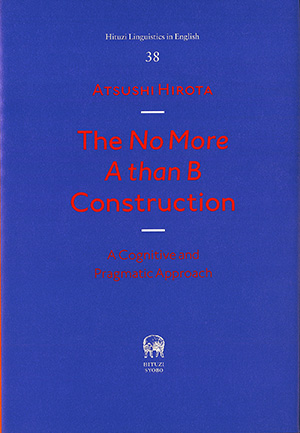2024年3月刊行

Hituzi Linguistics in English No.38
The No More A than B Construction
A Cognitive and Pragmatic Approach
廣田篤(Atsushi Hirota)著
菊判上製 定価12000円+税
ISBN978-4-8234-1225-7
白井敬尚形成事務所(ブックデザイン)
 |
Hituzi Linguistics in English No.38The No More A than B ConstructionA Cognitive and Pragmatic Approach廣田篤(Atsushi Hirota)著 菊判上製 定価12000円+税 ISBN978-4-8234-1225-7 白井敬尚形成事務所(ブックデザイン) |


